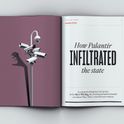Lessons brutally learned
Your piece on the UK’s failures in managing the pandemic, with the exceptions of the Treasury’s financial support operation and the vaccination programme, was excellent (“The unofficial UK inquiry,” March). Few in government come out of this story well. In particular, as you note, there was a failure to understand what the Chinese, New Zealanders, South Koreans, Taiwanese and Vietnamese understood—namely, that there is no trade-off between suppressing the illness and the health of the economy.
The evidence on this is quite clear: other things being equal, countries that suppressed the disease were also more economically successful. As I pointed out in the Financial Times, the explanation for this lack of a trade-off is also reasonably evident. People will not go back to their normal lives in the midst of a raging pandemic, especially when there is also a high death rate. The idea that the economy could ride this out while we sought “herd immunity” was ridiculous.
After this is over, we need to learn further lessons to ensure such a disaster is not repeated. But the big lesson when dealing with such a highly infectious disease is already clear, in my view: suppress it quickly, by controlling both the borders and the domestic spread. This is the way to return quickly to a relatively normal life. If one fails to achieve this, all options become horrible.
Martin Wolf, Chief Economics Commentator, Financial Times
Striking the balance
The essay that you published on Covid-19 has a number of odd features. First, the comparison between Covid deaths and those in the Battle of the Somme is in extremely bad taste. If you do not understand the difference between the deaths of men in the first flush of youth and those of average age over 80, you should not be writing about such a subject. Second, the authors do not mention the failure during the first few months to protect care homes—by far the most scandalous occurrence of the epidemic.
But the real question is how far there is a trade-off between shutting down the economy and society on the one hand and defeating the virus on the other. Of course there is such a trade-off. The decline in output in the first half of 2020 was the most severe in living memory. If there had been no trade-off, we would have maintained the most severe lockdown right from the outset until everybody was vaccinated. But that would have been even more disastrous.
Partly in order to encourage people to maintain lockdown, the media has focused on regular league tables of hospitalisations and deaths. That, in turn, meant that it became politically and socially almost impossible to countenance a less locked down, “Swedish” approach.
The correct statistic, however, is not the overall number of those dying after a positive test, but the excess deaths beyond those that could be expected at the time. The Covid deaths this winter have probably been somewhat offset by lower than usual deaths from ordinary flu: if you look at the figure for excess deaths over this period, it has been considerably less dramatic.
Your authors imply that the politicians failed to introduce lockdown sufficiently early and severely. But given the enormous costs of lockdown, it is very difficult to be sure where the balance of advantage actually lies. Indeed, we cannot begin to make such estimates until the full consequences of all the measures undertaken have played out. It will be for historians to estimate whether what was done went too far in one direction or the other. It is far too early to jump to any such conclusions now.
Charles Goodhart, emeritus professor, LSE
Judged wanting
As your recent essay illustrates, there is a growing sense that there must be a reckoning for the government’s flawed response to the pandemic. The prevailing view is for a public inquiry.
The key step is to appoint a chair. The appointment will condition everything that follows—from the terms of reference to the way the inquiry is both perceived and conducted.
What qualities does the chair need? She or he must have sufficient experience of—and expertise in—the subject matter to command the respect of all those affected. Furthermore, she or he must understand issues of procedural fairness and what constitutes evidence. This suggests a background in law. Does that mean that the chair must be a judge?
I am strongly of the view that the chair should not be a judge. The first reason is that judges are expected to be independent of other branches of government. To involve them, even after they have retired, in the chairing of public inquiries, usually into matters of public and often political disagreement, is to risk bringing their independence—and that of the judiciary generally—into question, and exposing previously unexpressed political views to public glare.
The second reason is that judges have spent their lives in courtrooms. They see issues in binary terms, as being true or false. They reach decisions rather than make recommendations, relying on the proposition that there is a single truth and that it can be elicited by the application of forensic skill. Troops of lawyers all claiming their moment in the sun through cross-examination is what they are used to.
And this is how public inquiries conducted by judges tend to turn out. They come to resemble a court of law—precisely what inquiries should not be. The procedural approach lacks the subtlety and sensitivity required.
Achieving the aims of any inquiry, let alone one held in the shadow of so many deaths, is inevitably challenging. Selecting the right chair is an essential first step.
Ian Kennedy chaired the Bristol Royal Infirmary inquiry
Plus ça change
In his profile of Joe Biden (“Cometh the hour…” March), Andrew Adonis compares the challenge facing the 46th president to the situation confronting FDR in 1933—a comparison that Biden himself has alluded to. This crisis is certainly on the scale of the Great Depression, with the US facing a devastating pandemic accompanied by serious economic consequences. At the same time, Biden faces a challenge of a new kind: a deeply divided nation in which the two sides inhabit different cultural realities.
Yet the very qualities that may help President Biden address the pandemic—and the other problems facing the US—are the same qualities that may hinder him.
Biden’s longstanding experience in the Senate, as well as his eight previous years in the executive branch, give him vital knowledge and understanding of government. But this also makes it hard for him to truly present himself as a radical, or as something other than “business as usual”—particularly following a president who portrayed himself as an outsider, even if the reality was more complicated.
By surrounding himself with experienced professionals, many of whom were in the Obama administration (or associated with the New Democrat era of Bill Clinton), Biden will have to work harder to be viewed as a departure from the past—as president in his own right. And while his willingness to work across party lines and to shift his views is reminiscent of Roosevelt’s pragmatism, it can easily be painted as mere triangulation or insincerity.
This, then, will be the fundamental tension of the Biden presidency: he must marry experience and practical-mindedness with radical solutions for the scale of America’s current crisis.
Alice Lilly, Institute for Government
Righting wrongs
In her review of What’s Wrong with Rights? (“Bang to rights,” March), Brenda Hale represented me accurately. Maybe we should expect such scrupulousness from a former president of the Supreme Court, but it is too rare to be taken for granted nowadays, and I am grateful for it. I am also pleased to observe that she does not contradict any of my main claims. Nor does she quarrel much with my analysis of the legal reasoning of courts, whether in London, Strasbourg or Ottawa.
She does think the title a misnomer, since I admitted during the Policy Exchange launch that there is a lot right about legal rights. (It is also the first thing I say in the conclusion.) But she wishes that I had been more affirmative. Surely, however, given the plethora of affirmative writing about human rights, there is room for a book that tries to understand and test the scepticism of many moral philosophers and theologians (and not just Conservative MPs)? Besides, the title does end with a question mark.
She also attributes the overreach of some decisions by the Strasbourg court to its simply “getting things wrong,” rather than to what I call zealous “rights-fundamentalism.” But that overlooks the question of why Strasbourg got it wrong. I gave an explanation based on the court’s explicit reasoning; she gives none.
Alluding to my treatment of the Supreme Court of Canada’s recent reasoning about assisted suicide, she wishes that I had appreciated better that, if the law presents judges with charters of abstract rights, they must use their discretion in interpreting them. True, but they can choose to exercise that discretion more or less conservatively.
Finally, she rebukes my lack of charity towards certain rights lawyers. I believe I represented what they have written justly—and charity begins with justice. Further, I sought, charitably, to appreciate their role as advocates for vulnerable individuals. I did then express irritation in some sharp criticism. But whether charity excludes disciplined irritation I rather doubt. Still, I shall take Lady Hale’s rebuke on the chin and ponder it.
Nigel Biggar, University of Oxford
Contradictions in Christ
Nick Spencer defends a “Christian” Jesus against Julian Baggini’s secular, ethical version (“The secular Jesus,” Jan/Feb). But the freshest accounts of Jesus never fit any neat category.
In Akwaeke Emezi’s novel Freshwater, Ada, the child of a Nigerian Catholic and a Malaysian, is possessed by gods, spirits and demons. She adores Jesus, but he never bothers to appear to her: “How can you leave a child alone like that?” As she grows older, “the fucking resurrected bastard” appears sporadically, wearing her down with his loving smile. Eventually, Ada finds a way to integrate him with her other spirits and demons. That feels real—though I suspect neither Spencer nor Baggini would approve.
Christians often elevate Jesus so much that he becomes utterly alien, while philosophers tie him down so much that he loses his mysterious power. Most of us are more empirical than that, in the sense that we trust our awareness, and triangulate it with that of others, through stories.
The historical sources of our knowledge about Jesus are diverse, contradictory and provocative. The cracks in the record are unbridgeable and life-giving. The 19th-century mystical theologian Anna Kingsford helpfully suggested that we think of revelation not as illumination in which all is made clear, but as “reveilation”—a re-veiling. The meanings of scripture, of poetry, and of life cannot be boxed up and pinned down. To debate whether Jesus was ethical, religious or both is to miss the point.
Linda Woodhead, University of Lancaster
The point of politics
Having written biographies of David Lloyd George, Keir Hardie, Jim Callaghan, Lord Addison and Michael Foot, I venture to interpose a few thoughts in the elegant “duel” between Malcolm Rifkind and Freya Johnston (“Does politics really matter?” March).
Whether you think politics is worth taking seriously depends on what you think the main purpose of it is. Take the American progressives in the years just before the First World War. For them, the object of politics was moral reform, not just of the political class but of the political culture. This meant direct democracy: taking the political process as close to the people as possible through direct primaries, initiatives and referendums, and petitions to recall judges.
Something resembling this comforting view, that politics is for purveying moral precepts, was still alive and well in the liberal reaction to Trump’s behaviour after his election defeat. Biden’s inaugural address was a paradigm of it. At the other extreme is the polemicist. An example can be found in Foot’s Guilty Men, attacking the Chamberlain government. The point is to discredit the other side, whatever the facts.
Between these extremes, political debate can be both trivial and banal. But in my later life I have had the good fortune to have a regular experience of political dialogue at a high level. My experience comes from a source which will inflict a tsunami of derision upon me, but I make no apology for it. In House of Lords debates, arguments are carefully defined and placed in a broad historical, philosophical and cultural context. Most astonishing of all, those across the chamber actually listen to what you have to say, rather than intervening in order to ensure their names appear in Hansard.
It is possible for political discourse to be enlightening and even inspiring. My answer to the question boldly posed by Prospect, as to whether talking politics is worth anyone’s time, is thus clear and uncompromising: a resounding “Maybe.”
Kenneth O Morgan, historian and Labour peer
In fact
All the coronavirus in the world could fit inside a Coca-Cola can, with plenty of room to spare.
The Conversation, 10th February 2021
In a recent poll, 84 per cent of black Britons rejected toppling statues as a form of protest.
Times, 24th February 2021
Public records for 125 people facing charges related to the US Capitol riot show that nearly 60 per cent had financial troubles: 18 per cent had been bankrupt (twice the national average) and a quarter had been sued for owing money.
Washington Post, 10th February 2021
Over 128m human-made pieces of debris orbit the Earth, along with around 3,000 defunct satellites and 2,000 operational ones.
Metro, 14th January 2021
In Iran, use of the messaging app Telegram takes up 60 per cent of internet bandwidth.
New York Times, 26th January 2021
In February, chess briefly surpassed Fortnite and League of Legends as the most-watched gaming category on livestreaming platform Twitch.
Protocol, 22nd February 2021
Until 1834, the UK had 33 official holidays, mostly saints days and religious celebrations. England and Wales now have eight bank holidays—only Mexico, with seven, has fewer. (Scotland has nine and Northern Ireland ten.)
Manchester Evening News, 3rd January 2021
Bill and Melinda Gates have more US farmland (242,000 acres) than any other private owner.
Land Report, 11th January 2021
The sovereign grant paid by UK taxpayers to the British royal family is £85.9m, less than Netflix spends on a single series of The Crown.
Guardian, 16th February 2021
Pizza is the world’s most popular takeaway: top in 44 countries including most of Europe, according to Google data. Chinese food is second, as the choice of 29 countries including the UK.
Daily Mail, 20th January 2021












